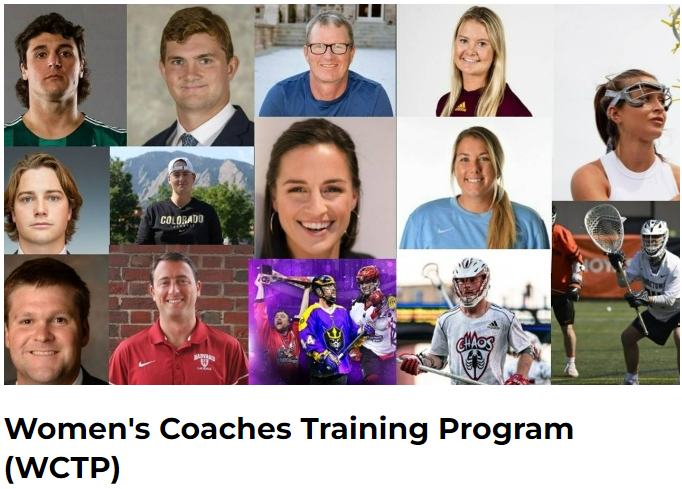A Lacrosse Weekend 1.28.23
Welcome to "A Lacrosse Weekend" my weekly compilation of thoughts, ideas, stories, myths, truths, about the great game of lacrosse. I hope you enjoy it!

If you are a men's or women's lacrosse player, coach, or parent, I think you will love the weekly content, videos, and analysis.
Andy Shay Podcast
One of my favorite people to talk lacrosse with is Andy Shay, Head Coach at Yale. Andy is a learning machine who is always experimenting with new approaches to everything from player development to strength and conditioning, to X's and O's. Andy is a believer in the Constraints Led Approach to coaching and we talk about this at length in this podcast. The book the "Talent Code" by Dan Coyle had a profound impact on Andy and his coaching and taught him the concept and importance of creating "Friction" to allow for the central nervous system to adapt to challenges. We talked a lot about different constraints he uses in practice such as time, space, goal sizes and shapes, long poles/short poles and it interesting how creative Andy is! Andy even experimented with goals in a "T" shape!
I asked Andy about his opinion on how a coach can be a constraint, good or bad. Andy's answers were very interesting and painted the picture of the Yale Lacrosse culture of player driven leadership. If you ever attend a Yale practice you will notice immediately that the coaches are not yelling, commanding, ordering players in any way. It is the players who are the lieutenants! The accountability is taken on by the players in a rather intense way.. freshmen will get ripped by upper class-men for sloppy subbing in a full field scrimmage. It's a coaches dream! Andy talks about how that culture emerged and why it's important.
We went on to discuss 1v1 defense technique and how he believes in covering dodgers by making them pick a direction utilizing a poke (one hand) while backpedaling. This was also a great transition into our discussion on short dodging vs long dodging, which is a very interesting topic. Below is a video on what "Short dodging" is!
Click here to listen to the Andy Shay Podcast!
Listen to more of the Phi-Lacrosse-ophy Podcast with Jamie Munro >>> www.PHILACROSSEOPHY.com <<<

An Ecological Approach to Player Development
Recently Alex Sarama, Creative Director for Basketball Immersion and Head Coach of the Italian Basketball Academy, Tweeted an amazing thread about how he uses an Ecological approach to his player development program at his basketball academy in Italy. I highly encourage you to read this thread! Today in my blog, I will attempt to show a lacrosse example of how I would try to teach the incredibly important skill of "Multiple Hitching" through an ecological lens.

Sarama goes on to say, "The goal of our "vitamins" (player development sessions) AND team practices are to allow our players to become skillfully attuned to the perceptual variables which are used to regulate their actions. We want to help our players develop effective perception-action couplings. Without information from movements and locations of opposing defenders, teammates, etc, there is little strengthening of functional perception-action couplings that are required to be successful."
Sarama and his staff create a profile for each player identifying strengths and areas for improvement for each player and uses this to create player development plans (PDP's) through an ecological lens.
Simply repping out a necessary skill doesn't work! Nor does just putting kids in a random small sided game and hoping a skill emerges. The ecological approach requires a coach to create environments with constraints that intentionally provide "Affordances" or invitations for action, and encourage an athlete to find a solution. The coach must recognize if the environment is actually resulting in the desired skills. Dialing up and down the "Friction" as Andy Shay says, or tweaking constraints is the key!
Now let's apply this ecological skill development model to the sport of lacrosse and how to get players to use Multiple Hitches. Watch the video of Jeff Teat making the game look easy! Why is it that Canadians use this level of patience and deception with multiple hitches regularly, yet American players rarely do?
In Canadian Box Lacrosse, the small nets create tighter confines with less space to dodge and therefore making the outside shot and the screen shot critical for success. When the defense extends to stop outside shots, it opens up the middle for cuts and dodges. Whereas in field lacrosse, there is so much space, players tend to hitch and go or face dodge to the net the vast majority of the time. Players will routinely pass up a great screen shot opportunity from the wing for a face dodge underneath resulting in a lower angle shot.
This video below shows how Canadians pump shot fakes to freeze the goalie and make the defender's reach or duck allowing them to set up their screen shot.
As Alex states, "This is also a great example of how drills (1v0 unopposed drills) don't transfer to the game. Working with lots of players at varied levels over the years, I really believe that many of these attractor states develop due to all the unopposed practice activities they have previously participated in."
Along the lines of habits formed through reps of unopposed practice activities, most US field lacrosse coaches have their players endlessly rep the technique of catching the ball loaded to shoot and release the shot as quickly as humanly possible. This is a sensible concept as quick release can be the only way to get a good shot off. With such a strong emphasis on one solution, one would think that this must be the only way to get a shot off, yet Canadians who are known for their quick release and quick-stick shots.. even from range, usually use more fakes, hitches, patience and deception.
Box lacrosse is the perfect Ecological petri dish, a game that has created the most magically skilled players in the world. In box lacrosse due to the tight confines, shots are more likely to to be blocked and once the goalie are in position it's easier to score if you can move him in some way, which has been the affordance that has led players to using multiple hitches.
Check out how our pick up game version of box lacrosse with small nets created a group of boys and girls players who naturally learned how to hitch the lights out!
Another unopposed drill that coaches do endlessly is the "Hitch and Go" drill. Everyone works on their hitch and go! This combined with more space to dodge in field lacrosse than box lacrosse has resulted in one hitch players: wind up and rip it or wind up and hitch and go. Rarely do we see the multiple hitches that we've seen from Canadians. As I alluded to earlier, part of the reason is Canadians are actually hitching to set up their shot while US players are usually hitching to set up their dodge.
In women's lacrosse we rarely see Multi Hitches and screen shots because of the rules of the game. Like men's lacrosse, the field is big so there is space for fast girls to have success using only their speed. Furthermore, the 3 second rules open up the middle, shooting space rules blow a play dead while a player might be winding up, and at the youth level there is literally no contact allowed which results in very fewer skills necessary to get to the net. Straight speed will do!
Multiple Hitches in Women's Lacrosse
Charlotte North in many ways has popularized wind ups and ripping shots from the 8 in women's lacrosse as she is one of the first players to truly look for outside shot and uses hitches not just to dodge to the net, but to find her screen or find her shooting lane. Watch this beautiful step back with multi hitches!
If you want to see a clinic on how to use hitches in your game, look no farther than these Nicole Levy highlights from last summer's Athletes Unlimited pro league. Nicole looks a lot like a Canadian or Native box lacrosse player. If you listen to a recent Inside the 8 Podcast where Colleen Magarity interviewed Nicole, who is now the assistant at Florida, you can learn about her philosophies!
I've had chances to chat with Nicole and she learned to play in the back yard on small nets with boys, which is just like our JM3 pick up game model from the Sandlot video above. Also,, her own physical constraints of not overwhelming size or speed taught her how to use deception to create offense! Every athlete has their own physical constraints that shape their affordances which are both positive and negative! It's obviously better to be bigger and faster, but at younger levels those advantages can actually limit development.
Creating Environments That Encourage Multiple Hitches
During the quarantine of 2020 I was trying to help my JM3 Athletes optimize their backyard development opportunities and made this video on a great way to work on multiple hitching. The same hitch that moves a goalie moves a defender. This is a great way to learn how a human reacts to different shot fakes with different footwork!
Multiple Hitches in 2x
This game is one of the best ways to learn how to Multi Hitch! For the same reason Canadians are more likely to multi hitch due to their attempts to get shots off in constrained space, you will see these players constantly faking and hitching to set up their shots, dodges and passes. We are seeing screen shots around defender's hips and around the pickers, Twisters when the defender is over playing the screen shots and the use of hitches for draw and dump passes, through drags, face dodge passes, lever passes, twister passes etc. All of these emerge naturally out of necessity! One key constraint that leads to more outside shots is a shot clock. At the end of a clock you need to get a shot off! We use a 12 second shot clock in a game of 2x!
Multiple Hitches in 1v1 + Picker
Similar to the 2x game, when the defender goes under a pick in this 1v1 + picker game, the dodger has to work their way closer to the net all the while looking for a shot or baiting the defender over the pick for a dodge. This game would have encouraged more hitches if there were a goalie in the net. Players are less likely to shoot an outside shot with no goalie in net. Further, in your Free Play games if you can get a padded goalie with at least a helmet and cup it will encourage more outside shooting which in turn will create more need for multiple hitching.
Outside the Arc Games
One of the best games for teaching players how to find the outside shot / screen shot through the use of multiple hitches is in our outside the arc games. The rule is you can't shoot from inside the arc (and 45 degree lines). In this particular game we have a 7-8 yard arc, 15 second shot clock, small net, tennis ball, padded goalie, and 45 degree angle lines from the arc to the crease forming lines resembling a women's 8. If you watch this video you will see players trying to figure out how to get shots off with defenders trying to get in the way and knock down shots.
In 2022 we hosted two Virtual lacrosse Summits with over 30 webinars in men's lacrosse, women's lacrosse, box lacrosse and more!
Check out this amazing subscription: www.virtuallacrossesummit.com/subscribe
The JM3 Sports Women's Coaches Training Program (CTP) is the largest video vault for lacrosse education on the entire internet and considered to be the "Netflix of Lacrosse". Join one of our membership levels to continue your lacrosse journey and become the best version of yourself with skills, drills, and strategies from the best coaches and players in the world.
Learn more about the Women's Coaches Training Program CLICK HERE
Have a great weekend!


